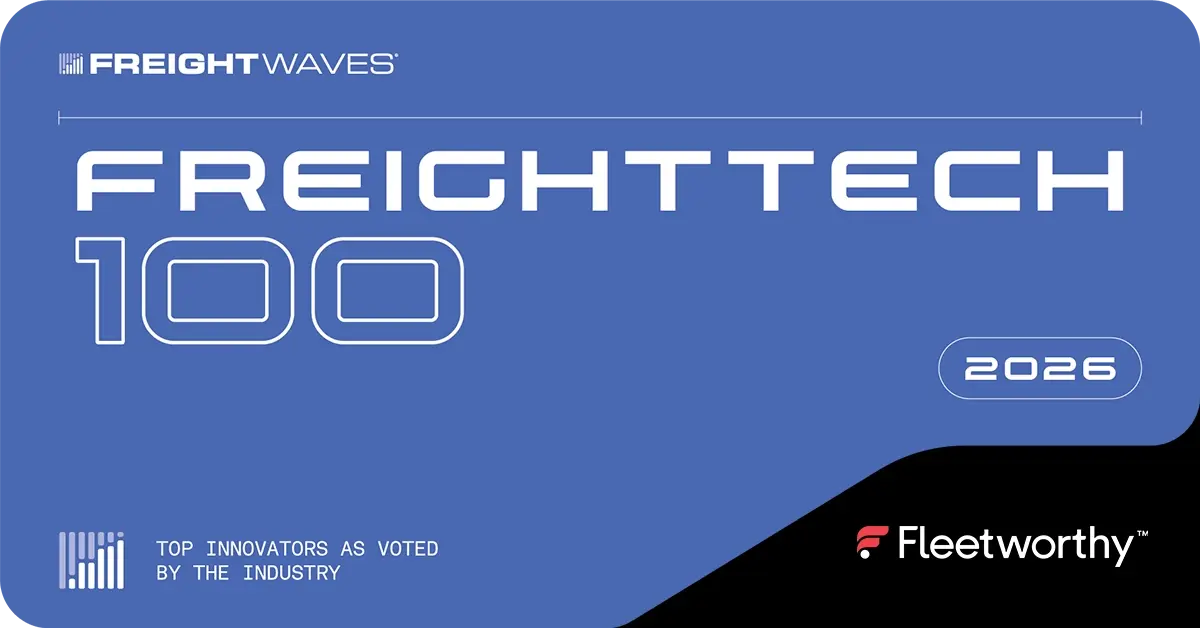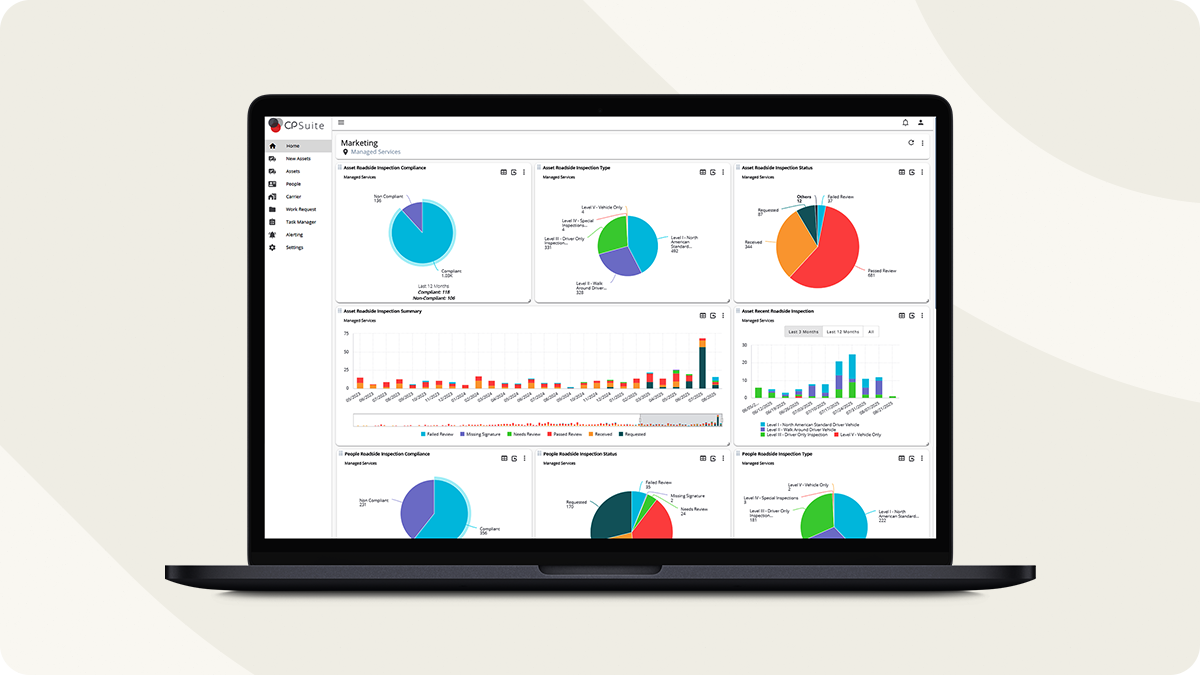Navigating the complex requirements of Federal Motor Carrier Safety Administration (FMCSA) regulations is essential for fleet managers. Ensuring compliance involves managing a web of driver qualifications, asset registrations, fuel tax records, and permit renewals, among other tasks.
When done manually, compliance can consume significant time and resources, introducing the potential for errors and costly fines. For modern fleets, the integration of technology and managed services offers a way to streamline compliance efforts, keep fleets safe, and stay ahead of regulatory deadlines.
Let’s explore how fleet managers can leverage technology and expert support to simplify compliance and operate with confidence.
The Technology-Driven Compliance Model: Key Components
Today’s most effective compliance solutions for fleet management are built around three key pillars: technology, data-driven insights, and expert managed services.
Technology: Centralized Compliance Platforms
A centralized compliance platform is a powerful tool for fleet managers to store, organize, and track all compliance data for drivers and assets. Most importantly, technology allows fleet managers to move away from manual processes and scattered spreadsheets by centralizing all compliance-related information in a single, accessible system.
A robust compliance platform is adaptable to the specific needs of a fleet. Some fleets may require extensive driver qualification tracking, while others may need detailed management of asset registrations or fuel tax records. To accommodate these variations, modern compliance platforms offer modular configurations. This modularity enables fleet managers to tailor the platform to address only the areas that apply to their operations, making it a flexible and scalable solution for fleets of different sizes and structures.
Additionally, role-based configurations allow compliance teams to assign specific permissions to users, ensuring that the right people have access to the appropriate information and tools. For example, a fleet manager might need access to all compliance data, while a safety director might focus solely on driver qualification files. By providing these role-based configurations, technology not only enhances security but also improves workflow efficiency by giving each team member access to the tools and data they need.
Ultimately, centralized compliance platforms are more than digital repositories; they offer fleets a way to manage compliance actively and with precision. Features like automated alerts, customizable dashboards, and smart reporting make it easy for fleet managers to identify compliance gaps, track renewal timelines, and stay ahead of regulatory requirements.
Data-Driven Insights
Access to real-time compliance data is vital for modern fleet management. Compliance platforms pull together essential data on drivers and assets, enabling fleet managers to keep an eye on every detail, from expiring documents to upcoming vehicle inspections. Data-driven insights allow fleet managers to spot trends, anticipate upcoming needs, and make informed decisions about where to focus time and resources.
One of the biggest advantages of a centralized data management system is real-time accessibility. When all compliance data is stored in a single system, fleet managers and compliance officers can quickly pull up necessary information, whether for internal review, regular reporting, or an audit. This immediacy of access is particularly beneficial during audits, as managers can provide auditors with accurate, up-to-date documentation on demand, reducing both the stress and the time involved in compliance reviews.
Moreover, data-driven insights empower fleet managers to be proactive rather than reactive. For example, by analyzing data on driver qualifications and asset inspection histories, fleet managers can identify patterns and predict future compliance needs. A real-time view of driver and asset statuses enables managers to address issues before they become compliance violations, reducing the risk of fines and keeping the fleet safe and legally operational.
In essence, data management doesn’t just simplify compliance; it transforms it. By centralizing, organizing, and making data readily available, fleets can maintain a comprehensive overview of compliance across all drivers and assets. This holistic view is critical for managing compliance proactively and making informed decisions that support both safety and efficiency.
Subject Matter Expertise
While technology and data management are powerful tools, they are most effective when backed by knowledgeable experts who understand the complexities of FMCSA regulations. Subject matter expertise is the third pillar that ensures all processes and practices align with current regulatory standards.
Compliance experts bring a depth of understanding to areas that can be challenging for fleets to manage independently. These professionals keep track of regulatory changes, ensuring that the compliance system is always aligned with the latest FMCSA and DOT requirements. Their expertise also allows them to spot potential issues technology alone may not catch, such as subtle errors in document submissions or inconsistencies in driver qualification records. For instance, it’s not uncommon for drivers to submit incorrect documents, like an outdated commercial driver’s license (CDL) or a medical card that’s close to expiration. Compliance experts review these submissions, verify their accuracy, and flag any discrepancies, preventing small errors from escalating into costly violations.
Another essential role that subject matter experts play is providing managed services that support fleets in their daily compliance tasks. Managed services include document review, license renewal support, and audit preparation. By handling these detailed, often time-consuming tasks, managed service teams free up internal staff to focus on other priorities, making compliance a more efficient and manageable process.
For fleet managers, having access to expert guidance offers reassurance that every compliance detail is being handled correctly. These experts can provide personalized support, answer questions, and offer insights on best practices, ensuring that fleets remain compliant without having to navigate the complexities of regulations alone.
In combination with technology and data, subject matter expertise ensures that compliance efforts are complete and accurate, giving fleets the confidence they need to operate smoothly and safely.
Fleet Management: Key Compliance Areas to Keep Fleets Road-Ready
Fleet compliance covers multiple critical areas—driver qualifications, asset registration and maintenance, and fuel tax reporting, among others. Each of these areas carries unique requirements, from tracking driver certifications to managing vehicle permits and calculating fuel tax. Together, they make up the foundation of a compliant fleet.
Driver Compliance
Compliance with FMCSA driver qualification standards is a core requirement for any fleet. These regulations require fleets to keep detailed records on each driver’s qualifications, medical certifications, and CDL status, collectively known as Driver Qualification (DQ) files. Managing these files goes beyond simple record-keeping; it involves continuously tracking document expiration dates, ensuring that licenses and medical cards are valid, and preparing for audits.
Asset Compliance: Keeping Vehicles Legally Operational
Fleet assets—trucks, trailers, and other vehicles—require careful oversight to remain compliant with FMCSA standards. Compliance in this area includes vehicle registration, permit management, and routine inspections. Each asset must have up-to-date registration and necessary permits, and fleets must ensure regular maintenance and inspections to avoid unexpected downtime and legal issues.
Fuel Tax Compliance: Simplifying IFTA and IRP Reporting
Fuel tax compliance is a significant challenge for interstate fleets. Fleets that travel across state lines must adhere to the requirements of the International Fuel Tax Agreement (IFTA) and the International Registration Plan (IRP), which calculate taxes based on fuel consumption and miles traveled in each state. This means maintaining precise records of fuel purchases, distances traveled, and vehicle weights—a task that can become time-consuming and complex without a structured approach.

How Technology Empowers Proactive Compliance Management
The advantages of a centralized compliance platform go beyond simple record-keeping. With technology, fleet managers gain the ability to anticipate and address compliance issues before they arise.
- Automated Alerts and Notifications: Platforms can be configured to send alerts whenever a compliance action is due. Whether it’s a driver’s medical certification nearing expiration or an asset’s inspection deadline approaching, automated notifications ensure that fleet managers never miss an essential task. This automated system enables proactive compliance management, reducing last-minute scrambling and avoiding the risk of missed deadlines.
- Customizable Dashboards and Smart Tools: Many platforms offer configurable dashboards with “smart” tools that present real-time insights on fleet compliance health. Fleet managers can easily track overall compliance percentages, drill into specific issues (such as missing driver qualifications or asset registrations), and make informed decisions on where to focus attention. These dashboards turn complex data into clear, actionable insights, ensuring that fleet managers have a continuous overview of their compliance needs.
- Comprehensive Reporting and Analytics: With technology-enabled reporting, fleet managers can generate regular reports to monitor compliance across all aspects of fleet operations. These reports provide a snapshot of current compliance statuses and identify areas where additional action may be needed. By scheduling regular reports, fleet managers receive consistent updates on compliance health, helping them stay prepared for audits and regulatory checks.
The Value of Managed Services in Ensuring Compliance Success
While technology offers tools for organizing and tracking compliance, managed services add a human layer of expertise that helps fleets address unique challenges and complex requirements:
- Document Review and Validation: Managed service teams play a critical role in verifying that all documents meet regulatory standards. For example, these teams review driver qualification files to ensure that documents, such as CDLs and medical cards, are correct and current. Managed service providers can also flag inaccuracies before they create issues, saving fleets from potential fines or penalties during audits.
- Support for Compliance Audits: During FMCSA audits, managed service teams provide invaluable support by helping fleets organize and present required documentation. Compliance experts familiar with FMCSA standards can ensure that all files are complete and ready, minimizing the burden on fleet managers and improving the likelihood of a successful audit outcome.
- Regulatory Updates and Ongoing Compliance Monitoring: Managed service providers stay current with regulatory changes and industry trends, so fleets remain compliant even as standards evolve. This ongoing vigilance ensures that fleet managers don’t need to monitor changes independently, reducing the risk of accidental non-compliance.
Leveraging Technology and Expertise for a Compliance Advantage
For fleet managers, the combination of technology and managed services offers an effective path to achieving consistent compliance. A technology-driven compliance platform streamlines document management, provides real-time data insights, and ensures that fleet managers never miss critical compliance tasks. Managed services complement these tools by providing expert support and review, helping fleets navigate complex regulatory requirements with confidence.
Fleetworthy’s CP Suite: Your Partner in Compliance Success
Fleetworthy’s CPSuite is designed to bring the power of technology, real-time data insights, and expert support together in one seamless platform, helping fleets achieve total compliance with ease. CPSuite’s customizable dashboards, automated alerts, and detailed reporting keep you ahead of critical tasks for driver qualifications, asset registrations, and fuel tax management. Additionally, Fleetworthy’s managed services team of compliance experts provides document review, regulatory updates, and audit support, ensuring your fleet meets FMCSA standards and stays ready for the road.
Transform compliance management with Fleetworthy’s CPSuite and experience a streamlined, proactive approach that safeguards your fleet from costly errors and compliance risks. Contact Fleetworthy today to learn how CPSuite can simplify your fleet’s compliance journey.




